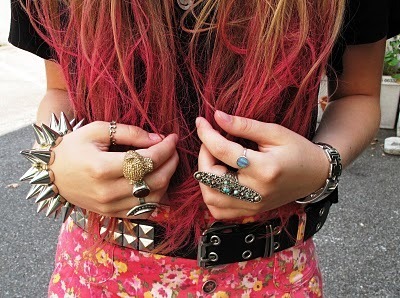Is it normal?
Though hair loss isn't generally considered a health threat, it does affect the way we feel about ourselves. The scope of a hair loss problem is therefore not determined by counting the number of hairs you are losing per day but by the way it makes you feel.
I believe you are the most qualified person to judge whether you have a problem with it or not. If it seems different, it probably is, and this is not a case in which you have to accept it just because it is a common problem and isn't life-threatening. Hair loss may just be a clue to a lack of well-being or a more serious condition, and by treating the it holistically you may experience improved vitality in other ways too.
Now all we need to do is figure out what's causing it...
The only real medical concern may be sudden and patchy hair loss occurring all over the head and is best seen by a dermatologist or trichologist, as this may indicate a disease of the hair follicles called alopecia areata.
Apart from that you may be experiencing temporary hair loss due to fluctuating hormonal levels. These can be experienced at times like puberty, going off the contraceptive pill, childbirth and menopause. If the hair does not grow back normally afterwards, your hormonal system may have gone out of balance and need to be attended to.
Another cause may be prolonged stress on the body's organs and systems which can lead to illness and a lacklustre appearance. Stress will most likely manifest in a number of other symptoms which can include fatigue, bad skin, poor weight management, migraines and insomnia. When we are free of a chronic stress situation we may not necessarily be free of these symptoms and we need to rest our body as well as feed the body with the correct nutrition it needs to repair and sustain itself.
However if you are experiencing progressive hair thinning and loss, the answer most probably lies in genetics. Let's have a look at what Dr. Michael Mol has to say about it:
7 out of 10 men will suffer from Androgenetic Alopecia, which is the scientific name for the genetic predisposition in men for pattern hair loss - and is the cause of over 95% of all balding.
That doesn’t leave much room for all the Old wives tales about balding – and rightly so, because most of them are downright wrong; Standing on your head or massaging your scalp is an act of futility, there is simply not enough evidence to label bad circulation as a cause. Wearing a hat, long hair or a ponytail has no detrimental impact on your follicles. Stress plays a possible role, but for significant hair fallout you’d have to live through several months of extreme emotional turmoil. Sweating is a possible contributing factor, through clogging and killing follicles – but most shampoos will combat that consequence. A good rule of thumb is - if it didn't make you bald when you were 15, it's probably not making you bald now.
Science has yet to prove what is truly responsible, but this they do know: DHT (Dihydrotestosterone) is a naturally occurring hormone (that assists with sexual development during puberty), which triggers an autoimmune response, initiating an attack on the hair follicle. With each progressive growth cycle (as we get older!) the hair gets shorter and thinner, withering until it finally turns into unpigmented vellus hair – or peach fuzz!
Our individual susceptibility to that hormone differs – and that’s where genetics come into play. The tendency to lose hair is inherited from either parent (it’s a myth that the mothers’ side is more crucial!), and stretches as far back as 6 generations.
So, beside a proper haircut, that can make a vast difference in diffusing hair loss, is there any real hope for the “bald & beautiful?” Absolutely! For the first time in history, medical science has shown that hair loss can be treated, and even reversed. You’re no longer obliged to glibly accept your fuzzy fate, but rather speak to a qualified dermatologist who’ll introduce you to a new world of “hair-raising" technology.
That doesn’t leave much room for all the Old wives tales about balding – and rightly so, because most of them are downright wrong; Standing on your head or massaging your scalp is an act of futility, there is simply not enough evidence to label bad circulation as a cause. Wearing a hat, long hair or a ponytail has no detrimental impact on your follicles. Stress plays a possible role, but for significant hair fallout you’d have to live through several months of extreme emotional turmoil. Sweating is a possible contributing factor, through clogging and killing follicles – but most shampoos will combat that consequence. A good rule of thumb is - if it didn't make you bald when you were 15, it's probably not making you bald now.
Science has yet to prove what is truly responsible, but this they do know: DHT (Dihydrotestosterone) is a naturally occurring hormone (that assists with sexual development during puberty), which triggers an autoimmune response, initiating an attack on the hair follicle. With each progressive growth cycle (as we get older!) the hair gets shorter and thinner, withering until it finally turns into unpigmented vellus hair – or peach fuzz!
Our individual susceptibility to that hormone differs – and that’s where genetics come into play. The tendency to lose hair is inherited from either parent (it’s a myth that the mothers’ side is more crucial!), and stretches as far back as 6 generations.
So, beside a proper haircut, that can make a vast difference in diffusing hair loss, is there any real hope for the “bald & beautiful?” Absolutely! For the first time in history, medical science has shown that hair loss can be treated, and even reversed. You’re no longer obliged to glibly accept your fuzzy fate, but rather speak to a qualified dermatologist who’ll introduce you to a new world of “hair-raising" technology.
But before you blame genetics, remember that hair loss is not considered a medical health threat so we can also consider that there are pharmaceutical drugs which actually have the unpleasant (but not medically-concerning) side-effect of hair loss!
We already know chemotherapy causes hair loss and now you are aware that the contraceptive pill can too. It may be the simplest way to find a clue for hair loss (or any other abnormal symptom you may be experiencing) by taking a look at the side-effects of any medications you have taken in the past (Google all your medications if you need to).
Medical Treatments
Back to what Dr Mol was saying, there are medical options available to treat genetic hair loss. Dr. Kevin Alexander (M.B.B.Ch.), for example, practices at the Hair Loss Clinic in Johannesburg, South Africa, and is available for a consultation (via Skype if necessary) to discuss diagnosis and treatment of hair loss.
For your interest and understanding a medical point of view, Dr. Alexander answers the following questions and more at http://www.hairloss.co.za/faq.html
- What is the difference between normal and abnormal hair loss ?
- What are the main and other causes of hair loss?
- Does diet influence hair loss?
- Can hair loss be treated, and if so how?
- Are there any preventative measures that can be taken to avoid hair loss, and if so what?
- At what stage, if any, would you suggest a patient undergo hair replacement/ transplant?
- How do hair replacements/transplants work and for how long do they last? Are they very noticeable? Do they require special treatment?
1) Medications: Finesteride, Propecia or Regaine/ Rogaine/ Minoxidil.
2) Replacements/transplants
Medical treatments for all types of alopecia:
3) Low Level Laser Therapy (LLLT) - laser light is absorbed by the cells (photo biotherapy) which stimulates cell metabolism and enables damaged cells to repair themselves.
4) Bio-Electro Magnetic Energy Regulation (BEMER) - is able to help one recover from stress, injury and pain, improve the condition of the skin, improve the functioning of organs and promote general well-being by assisting the following natural processes of the body:
- Micro circulation
- Macro circulation
- Partial oxygen pressure
- Protein bio-synthesis
- ATP production
- Immune system
- Analgesic and anti-oxidation regulation
- Repair mechanisms
Natural Treatments
There are also natural supplements which are also known to be effective for treating hair loss and stimulating growth. The main ones are:
- Saw Palmetto
- Nettle
- Pygeum
- Zinc
- And Essential Fatty Acids
- Nutrition, Diet & Exercise - According to Mary-Ann Shearer of The Natural Way, our lifestyle can affect the balance of our hormones. By eating correctly we can rebalance the acidity/alkalinity which our body needs for healthy processes and a healthy hormonal system. Read her book "Perfect Health: The Natural Way" for more information or attend one of her talks listed on her website www.naturalway.co.za
- Aromatherapy massage - Massage stimulates the blood flow which helps to relieve tension and promotes healthy cells. Essential oils are also known for balancing and conditioning the scalp and hair. Some of the best oils for stimulating hair growth include Rosemary, Lavender and Neem, but just about all the oils are beneficial due to their anti-bacterial and oil-balancing nature.
- Hair Colour & Other chemical processes - Care needs to be taken to avoid overprocessing the hair and harming the scalp. Hair colours should not be left to process for longer than an hour. Normal hair colouring and highlighting should process between 20 minutes and 45 minutes. Perms and straighteners should be processed according to the manufacturer's instructions and relaxers often only process for 15 to 20 minutes and are best applied and rinsed timeously.
- Shampoo - Changing your shampoo affords the opportunity of eliminating harmful ingredients like SLS and substituting them with vitality-enhancing and balancing ingredients like essential oils.
See also: Caring for a Sensitive Scalp
Aromatherapy: Essential Oils for treating Hair and Scalp
Secrets to Strong, Healthy Hair
Healthy Hair From The Inside Out
Naturalmente - Shampoos & Conditioner/Treatments
Organic Hair Colour - Does it exist?
Hair Dye Allergy, Henna & Pregnancy








